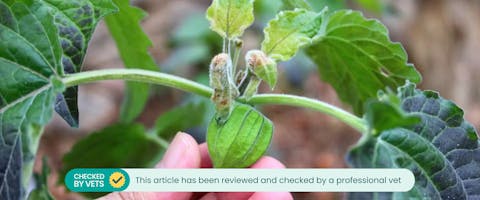Updated 09/08/2023
Nightshades: otherwise known by Solanaceae, they’re some of the most varied plants going, with some annual, others perennial, many vines, shrubs, trees, and ornamentals. So, if your garden is home to plants of all shapes and sizes, it’s likely you’ve got at least a couple of nightshade plants lurking in there. So with that in mind, is nightshade poisonous to dogs? Let’s find out.
Trending posts
Purr-use some of the top blogs our members have been loving this month- Top male dog names for your new furry friendGot a new furry family member in your pack? Check…

- Top female dog names for your new fluffy palWelcoming a new pooch into your family? Explore…

- 250+ gray cat names your silver feline will loveRecently welcomed a fluffy gray bundle of joy into…

- What are normal pet sitting rates?Discover the average pet sitting rates for animals…

- Unique dog names to stand out from the packDare to be different with our list of the best…

Is nightshade poisonous to dogs?
Yes, nightshade plants are poisonous to dogs, however, they vary considerably in toxicity. One of the most toxic is Belladonna, otherwise known as deadly nightshade. This plant often grows in hedgerows and has shiny black berries, which can be quite attractive to our furry friends. Other members of the Solanaceae family include tomatoes, potatoes, and eggplants, which are only mildly toxic and would need to be consumed in very large quantities to cause problems.
Sadly, if your pooch ingests part of the deadly nightshade plant, it’s highly likely they’ll experience toxic effects. The plant can cause all kinds of nasty symptoms of toxicity, including difficulty breathing and dilated pupils – two of the earliest signs of poisoning. So, if you think your pooch has taken so much as a nibble of a deadly nightshade plant, you should get to a veterinarian as a matter of emergency, as hospitalization might be necessary.
Nightshade poisoning in dogs
Now we’ve established that deadly nightshade and dogs simply don’t mix, let’s get you clued up on the symptoms dogs might experience if they’ve ingested part of the plant. As we’ve said, the symptoms of nightshade toxicity are very serious in dogs, so you shouldn’t be waiting for symptoms to arise before getting medical attention for your pooch. Alongside symptoms, we’ll also explore some of the methods of diagnosis you might expect from your vet, as well as the treatments that might be administered to combat the poisoning.
Symptoms
If your dog has eaten deadly nightshade, these are the symptoms they may end up suffering from.
- Dilated pupils
- Difficulty breathing
- Drooling excessively
- Reduced appetite
- Vomiting
- Diarrhea
- Confusion
- Drowsiness
- Weakness
- Trembling
- Reduced heart rate
- Paralysis
- Death
Diagnosis
If you’re concerned about your pet, then you should take them to your veterinarian immediately. It’s worth taking a sample of the nightshade plant with you, if possible, but your main priority is to get your pooch to the vet as quickly and safely as you can.
Your vet will start by doing a physical examination on your dog to check their heart rate, breathing, and mental status. They might also suggest some other tests such as urinalysis, blood tests, and electrocardiograms (ECGs) to check their heart rhythm. This will help them to work out how to help treat your pet.
Treatment
Your veterinarian will determine the appropriate treatments for your pooch based on their findings, but below are some of the possible ways your pooch will be nursed back to the best health possible.
- Oxygen support
- Medication to counteract heart rate abnormalities
- Induced vomiting to reduce the amount of toxic plant material in the stomach
- Activated charcoal to prevent further absorption of any remaining toxins
- Intravenous fluid therapy to counteract dehydration and help protect the kidneys from toxic damage
Meet our veterinary expert, Rebecca
This article has been checked by veterinarian Rebecca MacMillan, BVetMed MRCVS. Rebecca is a companion animal vet who has always had a passion for writing and client communication. Since her graduation from the Royal Veterinary college in 2009 she has gained a wealth of experience in first opinion small animal practice, in both clinical and managerial roles. She currently works in the South West and deals with a variety of routine and emergency appointments, but particularly enjoys medicine cases. Outside of work and writing, she enjoys spending time with her family, including her bouncy flat coated retriever George!
Other plants that are poisonous to dogs
Unfortunately, many of the plants we have scattered about our gardens are in fact incredibly dangerous for dogs. So, get to know the plants poisonous to dogs to keep your pooch safe, starting with those below.

